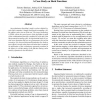Free Online Productivity Tools
i2Speak
i2Symbol
i2OCR
iTex2Img
iWeb2Print
iWeb2Shot
i2Type
iPdf2Split
iPdf2Merge
i2Bopomofo
i2Arabic
i2Style
i2Image
i2PDF
iLatex2Rtf
Sci2ools
134
click to vote
EH
1999
IEEE
1999
IEEE
On-Line Evolution of FPGA-Based Circuits: A Case Study on Hash Functions
An evolutionary algorithm is used to evolve a digital circuit which computes a simple hash function mapping a 16bit address space into an 8-bit one. The target technology is FPGA, where the search space of the algorithm is made of the combinational functions computed by cells and of the interconnections among cells. An experimental study is carried out to determine the best set of parameters for on-line execution. It is observed that small population size leads to more effective results when short execution time is required. An application of the evolutionary approach presented in the paper for on-line tuning of the function during cache memory operation is also discussed.
| Added | 03 Aug 2010 |
| Updated | 03 Aug 2010 |
| Type | Conference |
| Year | 1999 |
| Where | EH |
| Authors | Ernesto Damiani, Andrea Tettamanzi, Valentino Liberali |
Comments (0)

